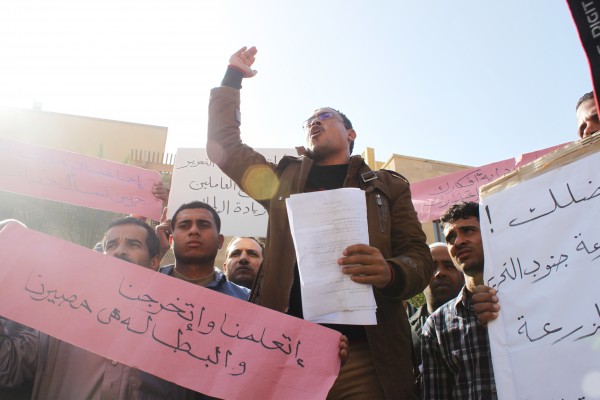South Tahrir Farms Must Remain Open, Workers Say
BY NADINE AWADALLA
@nadinetweetstoo
![South Tahrir farmers called on President Lisa Anderson to find a way to save their farms from closure [Al Sheikh]](http://www.auccaravan.com/wp-content/uploads/2014/11/IMG_6623-e1416153064669.jpg)
[Al Sheikh]
Workers from AUC’s South Tahrir farm have held daily demonstrations on campus since early last week to protest the impending closure of their facility in Beheira next year.
The farm will shut down due to the expiration of AUC’s 30-year lease of the land, which the Board of Trustees does not intend to renew.
The workers have demonstrated continuously and have even been sleeping in front of the administration building since last Saturday.
“We are here because we want to put pressure on the university [for the farm operations to resume],” said Sayed Amin, who has worked on the farm for the past five years.
They called on the university to either desist from closing the facility or immediately dispense compensation to the workers and staff who will be laid off as a result of the closure.
The demonstrators elected a representative to convey their concerns to President Lisa Anderson at the Tea and Talk event last Sunday.
Anderson told the Caravan that the university tried to establish a foundation to take over the operations of the farm, as all of the research-based operations have been moved to the New Cairo campus in what is known as the Research Institute for a Sustainable Environment (RISE).
According to Anderson, the state- run holding company that owns the farmland will only lease it to a credit-worthy institution and does not find a new foundation credible.
Anderson also said that the Board of Trustees is unwilling to take on a large credit risk on behalf of a different institution.
“We went to the Board of Trustees [this October] on behalf of this foundation and they said no, because they did not think it was central to the mission of this university and it was too much of a risk,” Anderson said.
The members that would have comprised the foundation met last Tuesday with representatives from the administration, faculty, students and workers, in an attempt to find other more agreeable solutions.
The meeting yielded two possible courses of action – either developing a mechanism that will allow the holding company to sustain the farm or seeking the help of a private investor or non- governmental organization (NGO) to obtain a lease from the holding company.
![South Tahrir farmers protest to save their jobs [Al Sheikh]](http://www.auccaravan.com/wp-content/uploads/2014/11/IMG_6603-e1416153477776.jpg)
MacDougall also noted that the administration has extended the operations until next May to help with the farmers’ transition.
However, Aref Moussa, training assistant at the farm and a representative of the strikers at the meeting, remains skeptical, saying that AUC does not give “credible promises”.
“We would like AUC to create a cooperation protocol with the holding company that would allow research operations, or even the farm’s impact on its community to resume,” said Moussa.
The workers claim they will continue demonstrating until their calls are met.
“We’re staying here till our demands are heard,” said Amr Hassan, an irrigation technician who has worked at the farm for the past 12 years.
MacDougall said he expects the workers to remain steadfast to gauge the university’s support for their issue.




